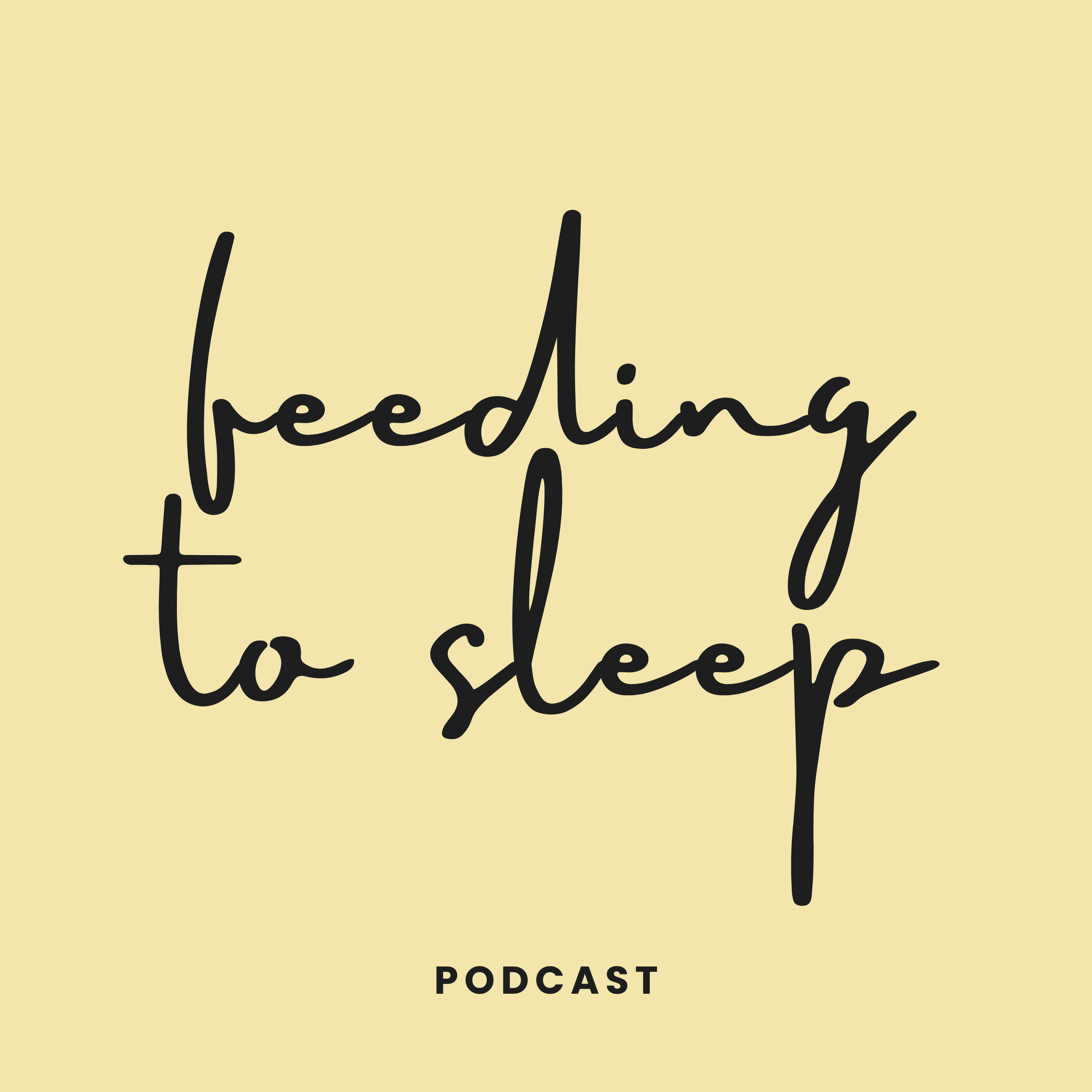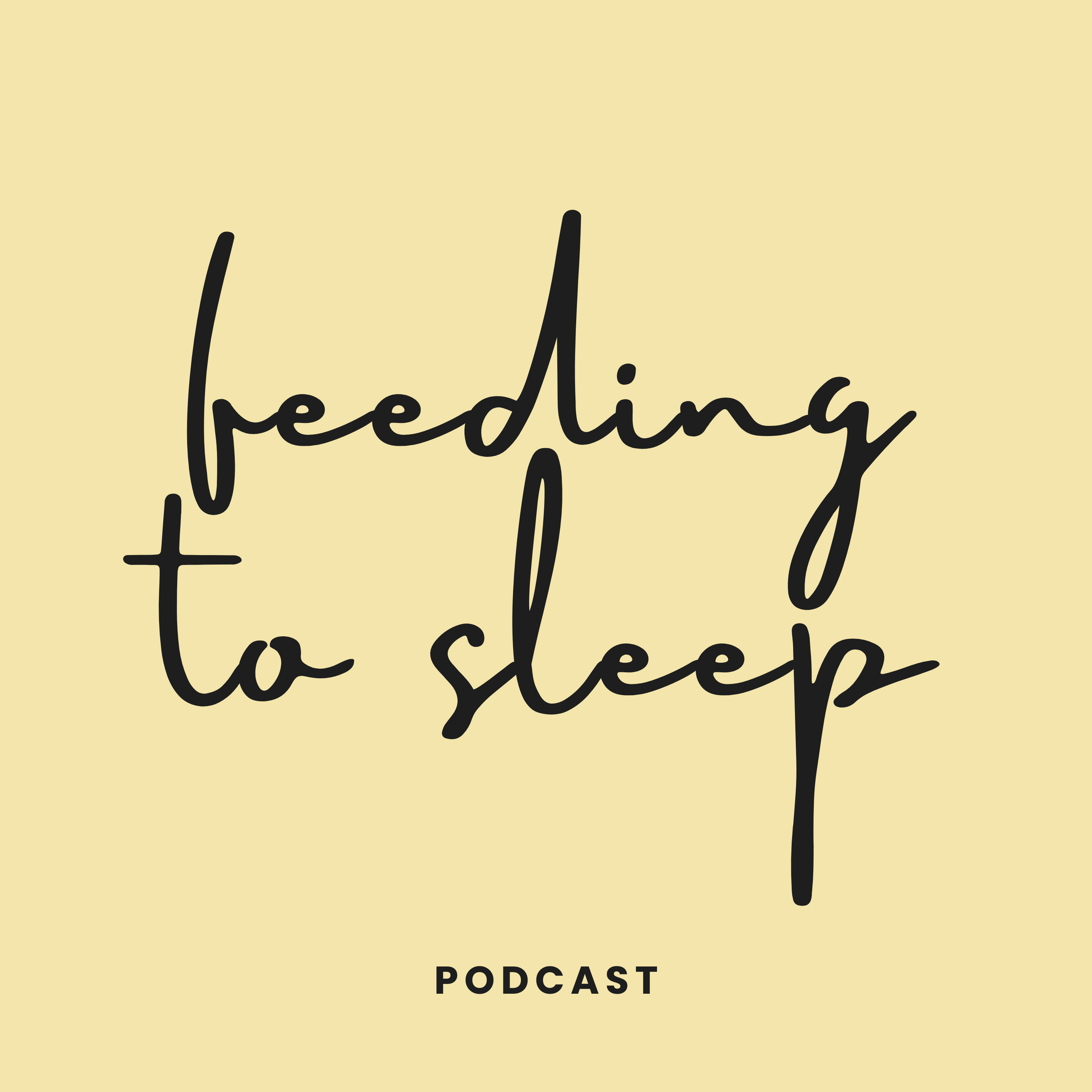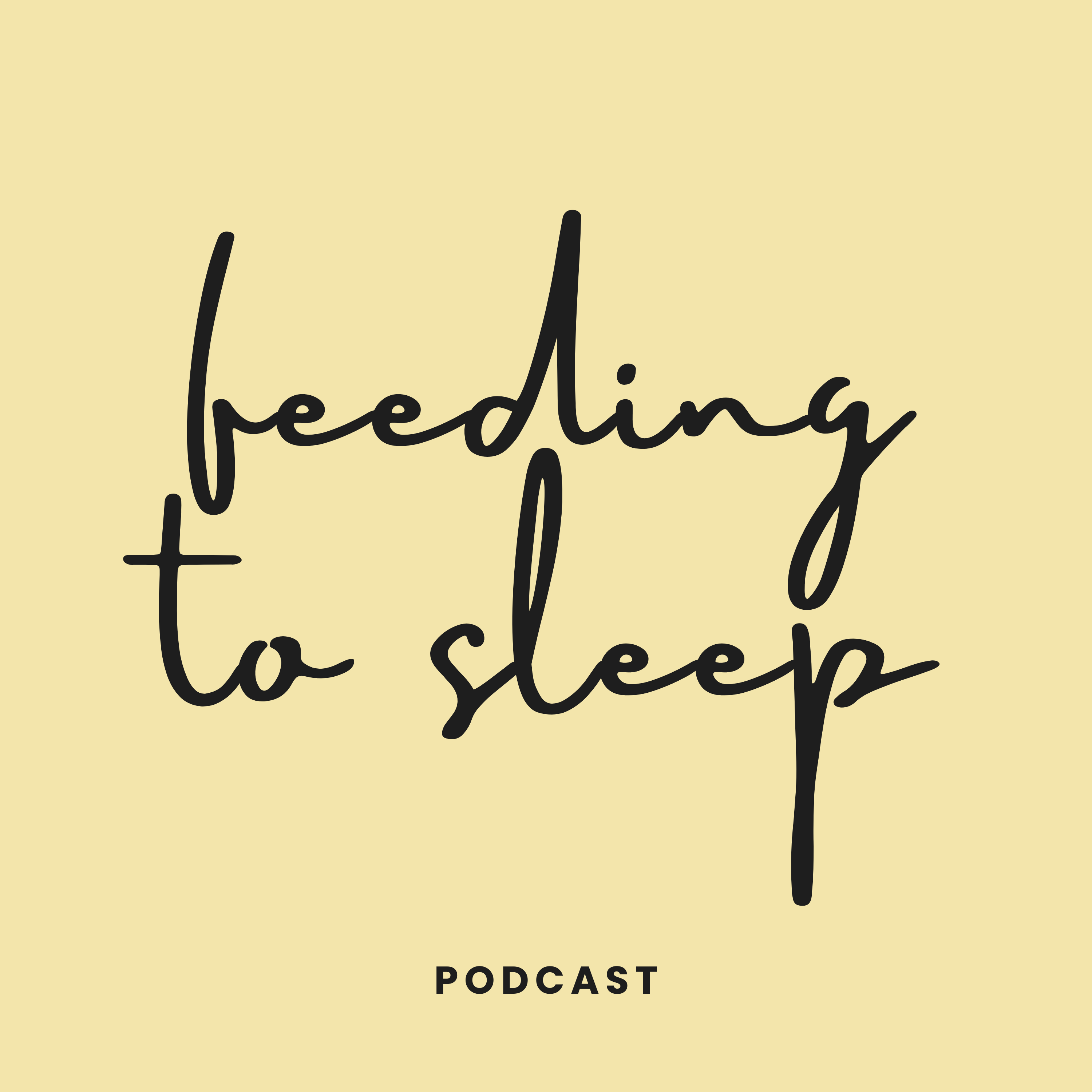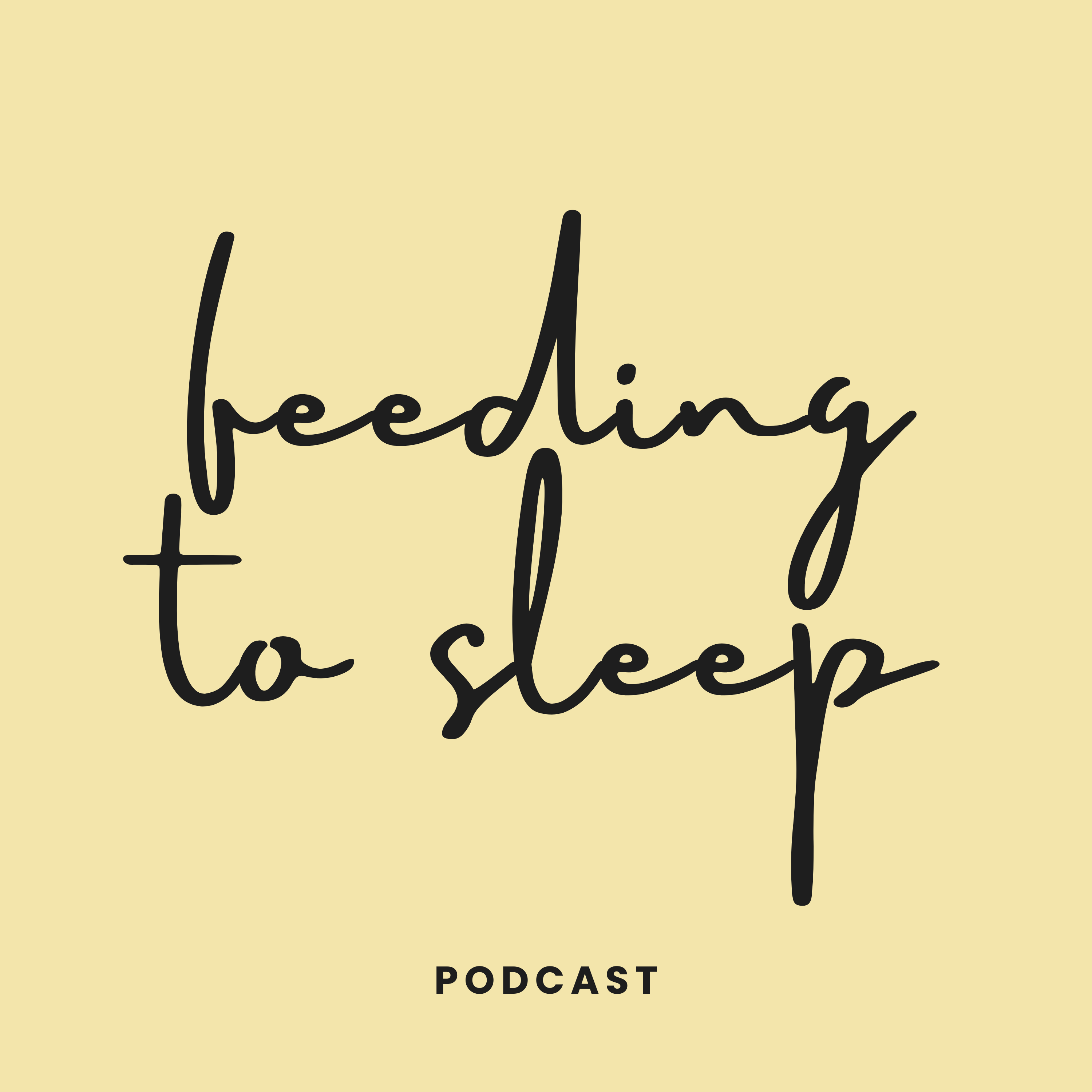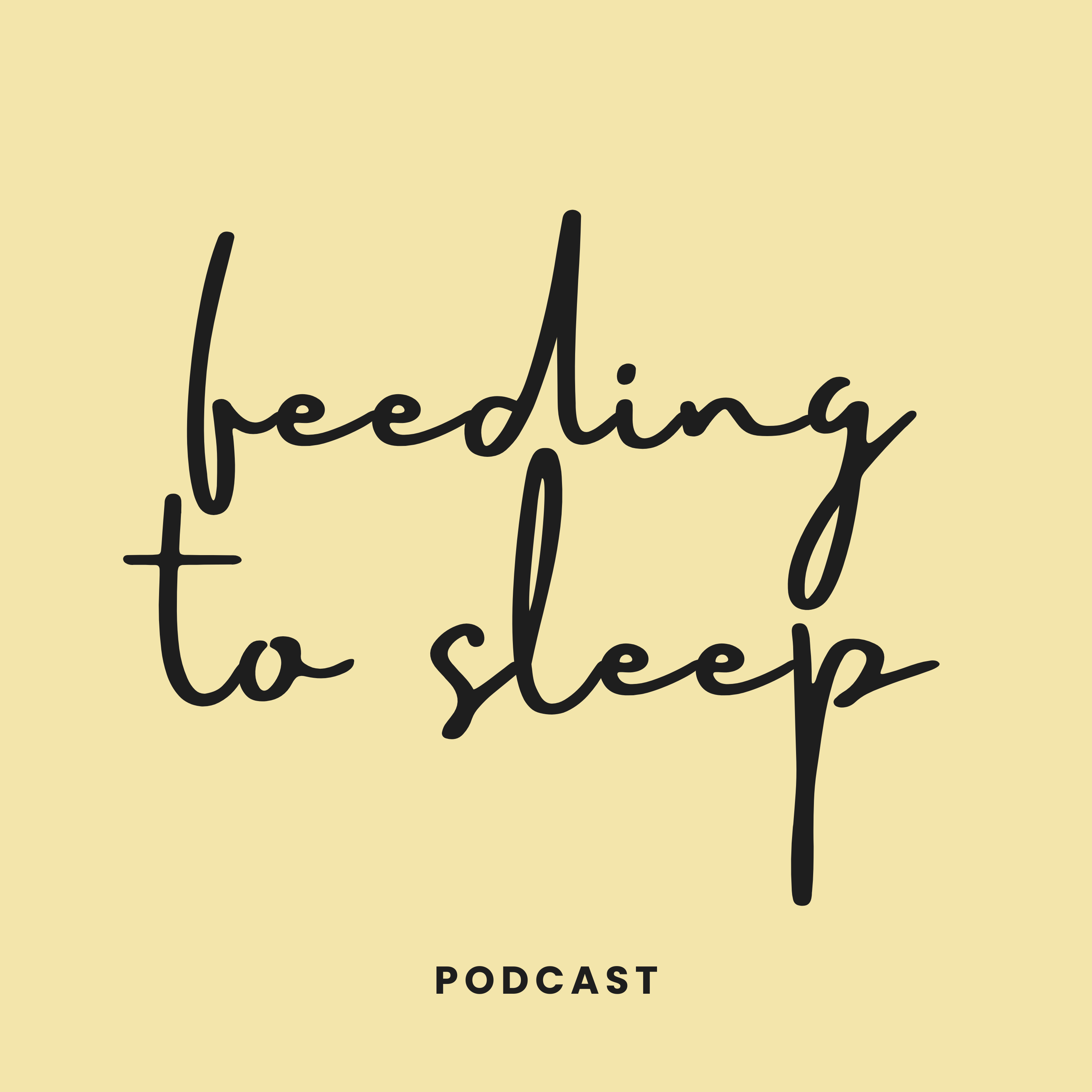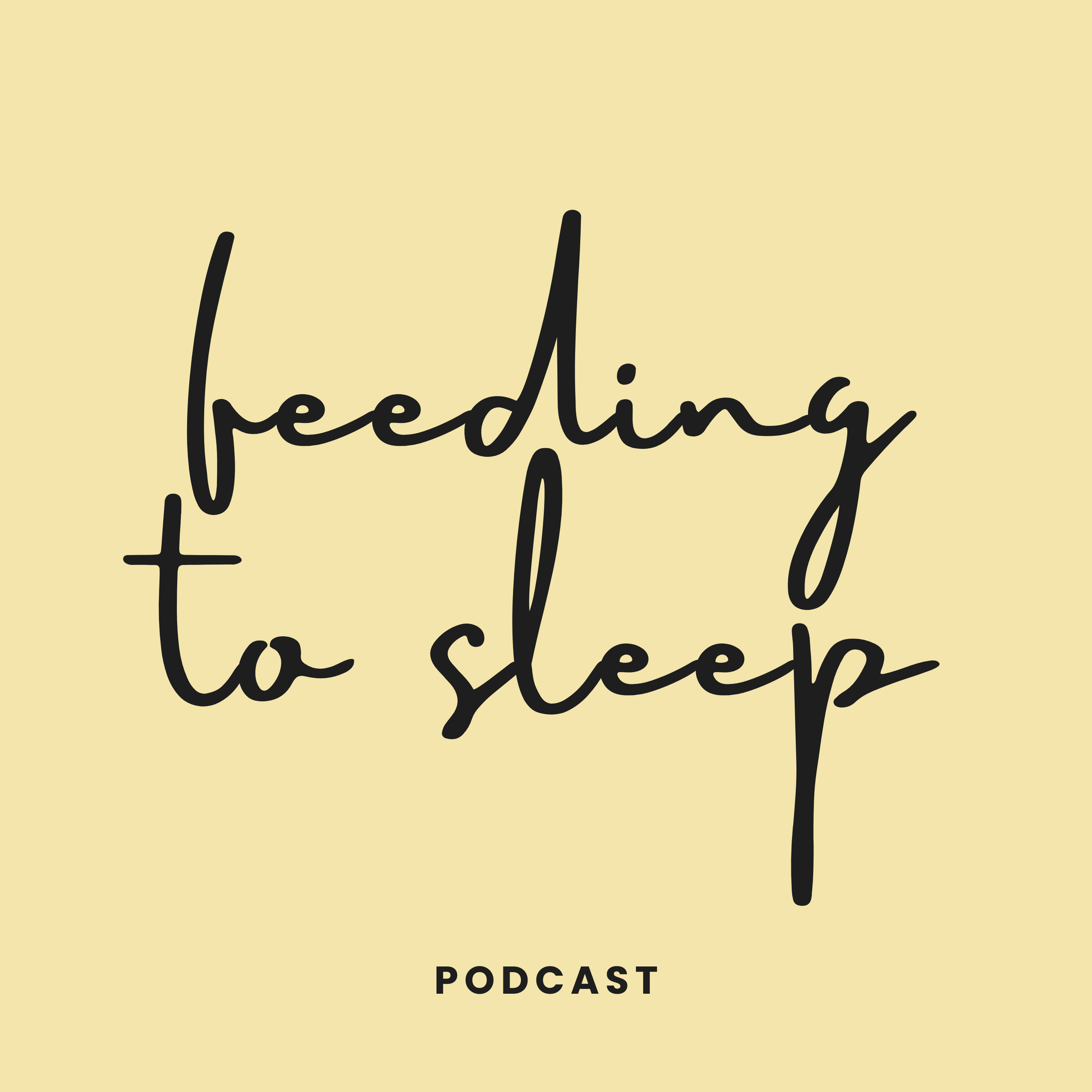Discover Feeding To Sleep Podcast
Feeding To Sleep Podcast

Feeding To Sleep Podcast
Author: Jess - Feeding To Sleep
Subscribed: 1Played: 2Subscribe
Share
© Jessica Channing
Description
Feeding to Sleep is a podcast for mothers doing sleep and parenting differently-feeding to sleep, contact napping, staying close. Honest, voice note style commentary on the trends, advice, and noise we scroll past while feeding in the dark.
feedingtosleep.substack.com
feedingtosleep.substack.com
12 Episodes
Reverse
I recorded this episode a few times before finding what felt right because I didn’t want to just go over all the viral posts like the ones that said things like “gentle parenting is raising brats, gentle parenting has gone too far, we are raising kids who are too soft…” there were more but I think you get the point. I feel like that conversation’s already been done.Instead I’m sharing what those posts brought up in me especially as someone who leaned hard on gentle parenting when I first became a mum. I thought if I just followed all the right scripts, I wouldn’t mess up my kids. But over time, it started to feel rigid. Robotic. Disconnected from what my kids and my nervous system actually needed.In this episode, I talk about:* Why gentle parenting stopped feeling good for me* What I’ve found instead in high nurture parenting* And how shifting away from perfection and into connection has been deeply healingIf you’re curious about high nurture, I highly recommend The Nurture Revolution by Dr. Greer Kirshenbaum.I’d love to know what’s your experience with gentle parenting? Does it feel like it’s helping or like something’s missing? This is a public episode. If you would like to discuss this with other subscribers or get access to bonus episodes, visit feedingtosleep.substack.com
I wanted to talk about this post by @goodnightmoonchild and @earthmilkmoonWhen I sat down to record this the post was sitting around 400 comments and now at the time of posting it’s at over 500. There were a lot of different opinions. Some people loved it. Others said it was giving tradwife and the post was called reductive, unrealistic and bashing mothers who choose to work.But here’s what I saw:I saw a post that called out what a lot of us are thinking but don’t talk about. That if is ok to reevaluate what matters, to take a pause, to slow down, to forgo the extras and be creative about it. A great reminder that you don’t have to justify wanting more presence, more time and more connection with your kids.👇 Let me know what it brings up for you and if you are-how you are choosing to get creative?Thanks for reading Feeding to Sleep! Subscribe for free to receive new podcast episodes. This is a public episode. If you would like to discuss this with other subscribers or get access to bonus episodes, visit feedingtosleep.substack.com
This week’s episode, I’m responding to a Reel (and the full YouTube video behind it) where a doctor lays out a strict sleep training plan and claims it’s not just about sleep, it’s about healing generational trauma.But here’s what’s actually being advised:* A rigid, clock-based routine: same wake time, same naps, same bedtime every day.* Wake your baby up if they fall asleep in your arms so you can put them down "awake."* Let them cry for 20 to 30 minutes repeatedly.* And if that’s hard for you? That’s your trauma. Not your instincts.And I just… no.In this episode, I talk about why this messaging is not healing, it’s pressure.Why I believe healing doesn’t come from withdrawing love or ignoring a crying baby.And why your discomfort isn’t proof that you’re broken, it’s proof that you care.Receive new posts about biologically normal baby sleep and feeding and consider becoming a free or paid subscriber.Here’s what I dive into in this episode:* Why letting your baby cry isn’t a parenting skill* How maternal instincts are being dismissed as emotional dysfunction* The deeply gendered and outdated history of mainstream sleep training* What the science actually says about how mothers and fathers respond to infant cries* Why healing can look like cuddling, feeding, rocking, and following your baby’s cues* And a personal story about how responsive parenting helped me begin to heal my own childhood woundsReferenced in this episode:Neuroscience of parental response to crying:* Parsons et al., 2016: Mothers show increased activity in emotional regulation and empathy regions in response to baby cries (Social Neuroscience).* Abraham et al., 2014: Mothers’ and fathers’ brains activate differently, mothers with emotional regulation, fathers more with logic and problem-solving (PNAS).Historical context:* Dr. Emmett Holt (1894) and Dr. Richard Ferber (1980s) popularized rigid, non-responsive sleep training methods. Both men. Neither developed these ideas from hands-on caregiving.Closing quote from:The Nurture Revolution by Dr. Greer Kirshenbaum“In order to build a brain that is resilient, healthy, and able to withstand adversity later in life, babies need brain-nurturing experiences while they are developing.”If you’ve ever felt like your instincts were the problem… they’re not.Responding to your baby is not weak.Wanting to hold them, comfort them, or keep them close is not trauma.It’s connection.It’s caregiving.It’s the work of real healing.With love + support,JessFeeding to SleepP.S. Have you seen this kind of messaging online lately? Did it make you feel confused, frustrated, or even a little judged? You’re not alone. I’d love to hear your thoughts—drop them in the comments or reply to this email.This post is not medical advice. This is a public episode. If you would like to discuss this with other subscribers or get access to bonus episodes, visit feedingtosleep.substack.com
This week’s episode is about a post that I came across that says “separating feeding and sleeping is an important ingredient in infant sleep.”And while the post does mention that it might not apply to newborns, the overall message still pushes the idea that:“if your baby is eating, they should be awake. If they’re sleeping, they shouldn’t be eating.”Except… that’s just not how babies work.Receive new posts about biologically normal baby sleep and feeding and consider becoming a free or paid subscriber.Feeding and sleeping have always been closely linked for babies. It’s built into their biology, their brains, and our bodies. Suckling helps babies settle. Night feeds support your milk supply. And yes babies of all ages can and do feed or comfort nurse while drifting in and out of sleep.That’s not something that needs to be “fixed.”Trying to separate the two too early can cause so much unnecessary stress. It often leads parents to feel like they’re doing something wrong for letting their baby fall asleep while nursing, or for using the breast as a tool to soothe, when in reality, that’s one of the most natural and time-tested ways to help a baby sleep.In this episode, I talk through what I saw, why it frustrated me, and what I want you to know if you’ve come across advice like this that left you second-guessing yourself.You’re not spoiling your baby. You’re not missing some secret method.You’re just parenting a real baby in the real world and you’re not doing it wrong if your baby still needs to feed at night.With love + support,JessFeeding to SleepP.S. Have you seen this kind of messaging online lately? Did it make you feel confused, frustrated, or even a little judged? You’re not alone. I’d love to hear your thoughts—drop them in the comments or reply to this email.This post is not medical advice. This is a public episode. If you would like to discuss this with other subscribers or get access to bonus episodes, visit feedingtosleep.substack.com
I’ve never taken a course to support myself with baby sleep, only courses to help me support other mothers with their baby’s sleep.But I’d been having a bit of a hard time with my baby’s sleep, so I decided it was time to try some support for myself. When I saw this course was being offered by Brittany, I had to sign up. I’ve been following her work since 2023, and she’s one of the few people supporting mothers with biologically normal baby sleep who truly inspired me to do the same.I signed up for Sacred Sleep, a 9-week program created by Brittany Chambers of @goodnightmoonchild and honestly, I’m so happy I did.I wanted to share my raw, unedited reflection on what it was like to be in a space made for mothers like me- navigating sleep with responsiveness, contact naps, bedsharing, and all the things that don’t fit the “mainstream”.This wasn’t a fix-it-all program.It was support.Reassurance.Nervous system education.Community.And a space that helped me feel a little more grounded through a really tired season.I found so much value in this course.I know the basics of baby sleep, I support other parents with it, and I still needed that reminder, that education, and that community for me.If you’ve been thinking about investing in support but you’re not sure if it’s “worth it”, I get it. But the right kind of support doesn’t try to fix your baby.It helps you feel more confident, more grounded and more understood.And that can change everything.If you’re curious about what it’s like, I share it all in this episode.You can listen to it here and if Sacred Sleep sounds like something that might support you too, here’s the link to check it out:It’s an affiliate link but I only share things I’ve personally tried and truly found helpful.I hope this episode helps you feel more confident about accessing support when you need it.You’re doing such important work.With love + support,JessP.S. If you’re in a hard sleep season right now, you’re not doing it wrong and there is support out there that aligns with what you value as a mother and parent. This is a public episode. If you would like to discuss this with other subscribers or get access to bonus episodes, visit feedingtosleep.substack.com
“We’re not going to start any new habits, because it could turn a small bump in the road into a huge sleep problem.”I heard this quote in a Reel from a very popular baby sleep consultant, the kind whose programs are even being offered by employers and I haven’t been able to stop thinking about it.This week on The Midnight Scroll, I’m talking about separation anxiety, “bad habits” and the fear-based messaging that pops up everywhere in the baby sleep world.The consultant featured in this video uses the term “gentle sleep training” but just to be clear, that’s her marketing language, not mine. Personally, I don’t find these methods gentle at all, and they don’t align with what I believe babies or parents truly need.The video that sparked this conversation came from a post by Reclamation Postpartum you can check it out here:It brought the issue back into focus for me, and I knew I had to talk about it.Because here’s the thing…Sometimes, your baby just needs you.And starting something new like rocking them again, feeding them on the couch instead of the bed, cuddling a little longer, isn’t you making a mistake.It’s you responding.In this episode, I’m sharing:* Why these “don’t start any new habits” messages can feel so heavy when you’re already in the thick of it* A personal story about how my 1-year-old’s bedtime needs changed (and what we did instead)* Why I believe in responsive care, especially during big developmental shifts* And how “habits” aren’t always the problem, we just need to reframe what we think they meanBabies grow. Their needs change. And your rhythms will shift too. That’s not a failure. That’s parenting.Episode 3 is up now listen on Substack, Spotify, or Apple.Let me know what’s worked for you during these kinds of changes, I’d love to hear.With love + support,JessFeeding to SleepNote: This podcast is not medical advice. This is a public episode. If you would like to discuss this with other subscribers or get access to bonus episodes, visit feedingtosleep.substack.com
This week on The Midnight Scroll, I’m talking about a product I keep seeing everywhere online:The Flow Nipple Shield+ by Munchkin.This product is being marketed as the first-ever nipple shield with a built-in milk flow channel so you can see your breast milk as it moves through the shield while you breastfeed.Sounds kind of innovative, right?It’s being promoted as a confidence-boosting tool, something to reassure you that your milk is flowing, your baby is feeding and to even help you tell when they’re “just ‘comfort nursing’.”But the more I’ve seen it, the more I’ve started wondering…Is this another gadget that’s going to make anxious mothers feel like they’re doing it wrong?In this episode, I’m diving into:* What this device claims to do* The messaging in the marketing that gave me pause (especially around “knowing when to stop feeding”)* Why this might add more stress than it solves for some mothers* My own (not-great) experience with nipple shields in the early weeks* And what I wish people knew before using any kind of breastfeeding deviceWhile preparing for this episode I had a look at the product’s official website, I wanted to see if it was mentioned that this product should be used with support and I couldn’t find anything on the product description page that clearly encourages parents to get support from a lactation professional. That’s a big concern for me, because nipple shields aren’t a one-size-fits-all solution.(There is mention of how this product is endorsed by some lactation professionals and resources for them regarding the product but again nothing noting that this is a product that needs support.)Yes, I love the idea of supporting breastfeeding confidence. Yes, I’m all for innovation.But tools like this need context, nuance, and actual support especially from someone like an IBCLC.A cool gadget will never replace a plan, a conversation, or a real look at what’s going on.If you’ve used this nipple shield or have thoughts, I’d love to hear from you in the comments.And if you’re feeling overwhelmed by the pressure to measure, track, and optimise every feed, you’re not alone. Come listen.Listen to Episode 2 of The Midnight Scroll on Substack, Spotify and Apple Podcasts.With love + support,JessFeeding to SleepNote: This podcast is not medical advice.Quotes sourced from https://www.munchkin.com/flow-starter-kit This is a public episode. If you would like to discuss this with other subscribers or get access to bonus episodes, visit feedingtosleep.substack.com
Welcome to Season 2 of Feeding To Sleep!I’m so excited to be back with a new season and a brand new segment I’m calling The Midnight Scroll, where I share my unedited and unfiltered takes on the world of baby sleep, breastfeeding, and motherhood on social media.We’ve all been there at some point: up in the middle of the night scrolling while feeding your baby back to sleep.These episodes are short, real, and a little bit messy (just like motherhood).I wanted to start with this quote because I’ve seen it everywhere on my feed:“All of my friends who have kids are in hell. I don't know anyone. l actually don't know anyone who's like happy and has children at this age.“ Chappell Roan on Call Her DaddyThe internet is divided on how they feel about her comments.Some mums are defending their choices.Some are agreeing.Others are calling her a mean girl and misogynistic.Some are saying she’s just being honest.It’s not a simple conversation and that’s kind of the point.Here’s what I think:Chappell isn’t making a sweeping statement about all mothers. She’s sharing what she sees in her circle of friends. From her vantage point. And where she’s standing as a young, single, touring, living in a completely different reality from her parent friends so it’s not surprising that motherhood looks like hell.And maybe her friends are struggling. Maybe they tell her they’re not sleeping. Maybe she sees the stress. Maybe, like a lot of us, they vent when they catch up with someone outside the chaos. And the way she speaks about it, it sounds like those could have even been the words her friends used to jokingly describe their experience.We will never know.That doesn’t make her wrong or a terrible person for the comment. It also doesn’t mean she’s seeing the full picture.Motherhood isn’t one single experience. It’s not hell. It’s not pure bliss either. It’s a lot of things at once.Joy, overwhelm, love, rage, grief, magic.Support for mothers is lacking and unrealistic expectations are everywhere, so ya it can feel like hell sometimes.But that’s not the whole story.There’s no perfect way to mother and there’s no perfect way to talk about motherhood either.But we do need more space for all of it.So I made some space for it.Listen to Episode 1 of The Midnight ScrollAnd let me know what you think about this quote.With love + support,JessFeeding to SleepNote: This podcast is not medical advice. This is a public episode. If you would like to discuss this with other subscribers or get access to bonus episodes, visit feedingtosleep.substack.com
Welcome to episode 4 of Feeding to Sleep the Podcast. For this episode I am sharing my breastfeeding journey and how I overcame challenges breastfeeding after a traumatic hospital birth. I talk about how I prepared for breastfeeding in pregnancy, what happened in the hospital after birth, what challenges we had and what support I accessed and my thoughts on everything that happened. Thank you so much for listening if you have any questions or comments reach out on Instagram @feedingtosleep and don’t forget to subscribe to the podcast so you can be notified when there is a new episode. Do you want to know what you really need for breastfeeding and sleep? There’s so much out there right now that you can buy but do you really need it all? I created an essential list to help you figure out what you need. I’ll give you a hint you don’t need a lot! Join the mailing list here: https://subscribepage.io/Essentialslist This is a public episode. If you would like to discuss this with other subscribers or get access to bonus episodes, visit feedingtosleep.substack.com
Normal baby sleep isn’t talked about enough. All we are told is that bedsharing is dangerous. That you should leave your baby to cry and learn to self soothe. After the birth of my first baby I thought I would never bedshare/cosleep. I put together the crib and bedside bassinet. My baby was only to sleep in those and that was it. Little did I know when he arrived he would have other plans for me. Check out the episode to see how we went from super strict never bedsharing to cosleeping saving my sleep. Check out @feedingtosleep on Instagram to grab your free Feeding to Sleep workbook to help you prep to breastfeeding. It will help you think about your breastfeeding goals, your sleep space, your birth and your support. To find more info on the Safe Sleep 7 here: https://llli.org/the-safe-sleep-seven/ This is a public episode. If you would like to discuss this with other subscribers or get access to bonus episodes, visit feedingtosleep.substack.com
Welcome to episode 2 where I talk about my birth in the public hospital system in Australia. This episode talks about induction of labour, epidural, episiotomy, 3a tear, fear in birth and how my first labour ended up being traumatic. Check out @feedingtosleep on Instagram to grab your free Feeding to Sleep workbook to help you prep to breastfeeding. It will help you think about your breastfeeding goals, your sleep space, your birth and your support. This is a public episode. If you would like to discuss this with other subscribers or get access to bonus episodes, visit feedingtosleep.substack.com
Welcome to Feeding to Sleep the podcast where I talk about everything from breastfeeding to baby sleep. I’m your host Jess. I’m an over 30 millennial trying to navigate motherhood. I became obsessed with all things birth, breastfeeding and baby sleep after I gave birth to my son in 2022. This podcast is where I want to talk about and share information to help new mothers feel confident breastfeeding and share what’s normal with baby sleep. I will talk about a variety of topics like birth, breastfeeding, motherhood, baby sleep, parenting, postpartum and also bring on guests for interviews and share my story. For the first episode I’m going to share my birth story starting with my pregnancy. I talk about being in the medical system during the pandemic, being stressed, morning sickness, pain during pregnancy, first trimester screening, NIPT test, pregnancy termination, chromosome issues, low Papp-a hormone, induction and being part of the public hospital system in Australia. Check out @feedingtosleep on Instagram to grab your free Feeding to Sleep workbook to help you prep to breastfeeding. It will help you think about your breastfeeding goals, your sleep space, your birth and your support. This is a public episode. If you would like to discuss this with other subscribers or get access to bonus episodes, visit feedingtosleep.substack.com



